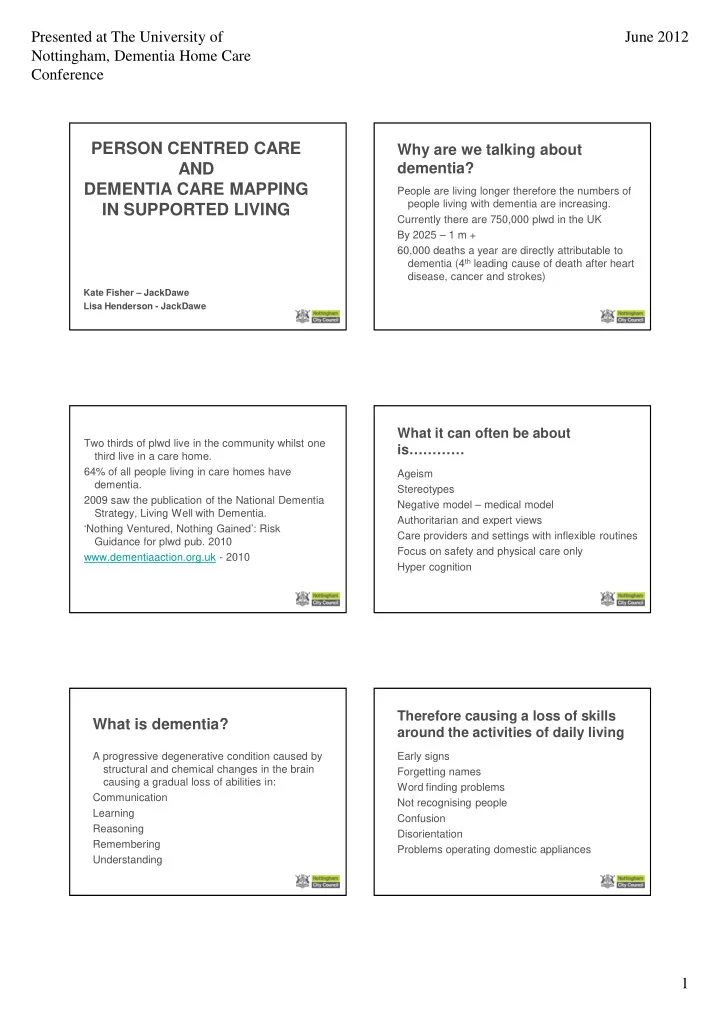

Presented at The University of June 2012 Nottingham, Dementia Home Care Conference PERSON CENTRED CARE Why are we talking about AND dementia? DEMENTIA CARE MAPPING People are living longer therefore the numbers of people living with dementia are increasing. IN SUPPORTED LIVING Currently there are 750,000 plwd in the UK By 2025 – 1 m + 60,000 deaths a year are directly attributable to dementia (4 th leading cause of death after heart disease, cancer and strokes) Kate Fisher – JackDawe Lisa Henderson - JackDawe What it can often be about Two thirds of plwd live in the community whilst one is………… third live in a care home. 64% of all people living in care homes have Ageism dementia. Stereotypes 2009 saw the publication of the National Dementia Negative model – medical model Strategy, Living Well with Dementia. Authoritarian and expert views ‘Nothing Ventured, Nothing Gained’: Risk Care providers and settings with inflexible routines Guidance for plwd pub. 2010 Focus on safety and physical care only www.dementiaaction.org.uk - 2010 Hyper cognition Therefore causing a loss of skills What is dementia? around the activities of daily living A progressive degenerative condition caused by Early signs structural and chemical changes in the brain Forgetting names causing a gradual loss of abilities in: Word finding problems Communication Not recognising people Learning Confusion Reasoning Disorientation Remembering Problems operating domestic appliances Understanding 1
Presented at The University of June 2012 Nottingham, Dementia Home Care Conference Early/mid stages Later stages Poor short term memory Problems with Better long term memory Eating Poor understanding of money Swallowing Withdrawal from usual activities Continence Getting lost in familiar places Loss of communication skills inc verbal (apparently!) Dressing/self neglect (more mid stages) End of life care The experience of dementia Being unable to access areas of memory ‘A person is not a passive victim of the disease as Make sense of an increasingly unfamiliar world the biomedical model would imply, but an active Being unable to recognise loved ones Being unable to cope with emotional demands person seeking to cope with, and manage, the Being unable to verbally communicate your needs disease.’ Loss of strengths – ‘weaknesses’ come to the fore Loss of personal identity and control over your life Woods (2001) Increasing dependence on other to feel secure and maintain confidence Malignant Social Psychology – ignored/talked over/treated as stupid Increasing susceptibility to stress and agitation – individual coping skills. Tom Kitwood How do we know what the Bradford Dementia Group experience of living with dementia and receiving care is actually like? The Enriched Model of Dementia Care Dementia = Neurological Impairment What frameworks do we use to Personality Biography (Life History) observe staff with? Physical Health Malignant Social Psychology Think CQC and Quality Audits! Also physical environment 2
Presented at The University of June 2012 Nottingham, Dementia Home Care Conference DCM is based on a serious attempt to take PLEASE NOTE: the standpoint of the person with dementia, using a combination of empathy and OTHER BRANDS ARE AVAILABLE!! observational skill Kitwood, 1997 Mood and Engagement Values ME value Behaviour Category Codes M Medication Very happy, buoyant. Very high positive mood. +5 A Articulation Very absorbed, deeply engrossed/engaged N Nod Land Of B Borderline Content, happy, relaxed. Considerable positive mood. Concentrating but +3 O Objects C Cool distractible. Considerable engagement. P Physical D Doing for self Neutral, absence of overt signs of positive or negative mood. Alert and +1 R Religion E Expressive focussed on surroundings. Brief or intermittent engagement. S Sexual expression F Food T Timalation Small signs of negative mood. Withdrawn and out of contact -1 G Going back U Unresponded to I Intellectual V Vocational Considerable signs of negative mood -3 J Joints W Withstanding K Kum and Go X Excretion Very distressed. Very great signs of negative mood -5 L Leisure Y Yourself Z Zero option Personal Detractions Intimidation Identity Disempowerment Withholding Attachment Imposition Outpacing LOVE Disruption Inclusion Infantilisation Objectification Labelling Comfort Stigmatisation Occupation Disparagement Ignoring Accusation Banishment Treachery Mockery Invalidation 3
Presented at The University of June 2012 Nottingham, Dementia Home Care Conference Examples how DCM – SL has influenced practice Personal Enhancers Warmth Empowerment Harry’s story Holding Facilitation Relaxed pace Enabling Respect Collaboration Acceptance Recognition Celebration Including Acknowledgement Belonging Genuineness Fun Validation To finish with Just a note of caution........ Gladys Wilson’s story – why good Change in this industry is not always dementia really matters and how straightforward you can make a difference in just a few minutes. We will need to keep focus on what we are trying to achieve Making things excellent means that we might not get things right first time, all of the time, but we must never stop trying Kate Fisher Kate.fisher@nottinghamcity.gov.uk Lisa Henderson Lisa.henderson@nottinghamcity.gov.uk 4
Recommend
More recommend